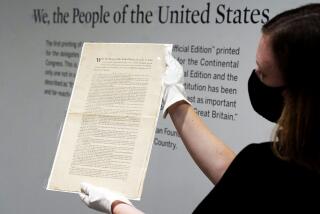Beethoven rediscovered: $1.7 million ‘Fuge’
- Share via
LONDON — A working manuscript of Ludwig van Beethoven’s “Grosse Fuge” sold for $1.72 million to an anonymous buyer, Sotheby’s auctioneers said.
Sotheby’s described the manuscript, discovered in a Pennsylvania seminary library, as “an astounding and important discovery” and possibly the most substantial manuscript of a Beethoven work to come up for sale in more than a century.
The buyer, who bid by telephone, paid $1.95 million, including the buyers’ premium, Sotheby’s said. It declined to say where the buyer was based.
“The manuscript was only known from a brief description in a catalog in 1890, and it has never before been seen or described by Beethoven scholars,” said Stephen Roe, head of Sotheby’s manuscript department.
“Its rediscovery will allow a complete reassessment of this extraordinary music.”
The 80-page manuscript is a piano duet version (opus 134) of the last movement of Beethoven’s string quartet in B flat (opus 130), which was first performed in 1826, a year before his death.
The “Grosse Fuge,” composed as part of a commission from Prince Nikolai Golitsyn of St. Petersburg, Russia, was originally published as the finale of the string quartet.
Because players found the music so difficult, the publisher asked for a simpler version, and the “Grosse Fuge” was then published separately (opus 133).
The piano manuscript was rediscovered earlier this year by librarian Heather Carbo at the Palmer Theological Seminary in Wynnewood, Pa., just outside Philadelphia’s city limits.
The manuscript is full of clues to Beethoven’s composition process. It is written in brown and black ink, sometimes over pencil, and includes later annotations in pencil and red crayon. There is evidence of deletions, corrections, deep erasures, smudged alterations and several pages pasted over the original.
University of Pennsylvania musicologist Jeffrey Kallberg, who authenticated the manuscript, said it was in pristine condition because it has not been touched or moved for many decades.
“It’s a very important discovery,” he said. “This was a controversial and not understood work because it was so ahead of its time. It sounds like it was written by a dissonant 20th century composer.”
The manuscript was last mentioned in an 1890 auction catalog from Berlin. The buyer is not documented, but seminary officials believe it was industrialist and composer William Howard Doane.
His daughter, Marguerite Treat Doane, in 1950 donated a collection of documents, including musical manuscripts that likely included the Beethoven, to pay for construction of a chapel.
“In all the Beethoven literature, it’s described as lost,” Roe said. “There are lots of alterations, changes, revisions that no one has ever seen.”
It was the second major musical discovery at the seminary, which is part of Eastern University.
Manuscripts by Mozart, Haydn, Strauss, Meyerbeer and Spohr, also given by Doane, were found in a safe in 1990.
The proceeds from the sale of the “Grosse Fuge” will be used to pay the seminary’s debts, build up the scholarship program and expand programs, the school said.
More to Read
The biggest entertainment stories
Get our big stories about Hollywood, film, television, music, arts, culture and more right in your inbox as soon as they publish.
You may occasionally receive promotional content from the Los Angeles Times.








